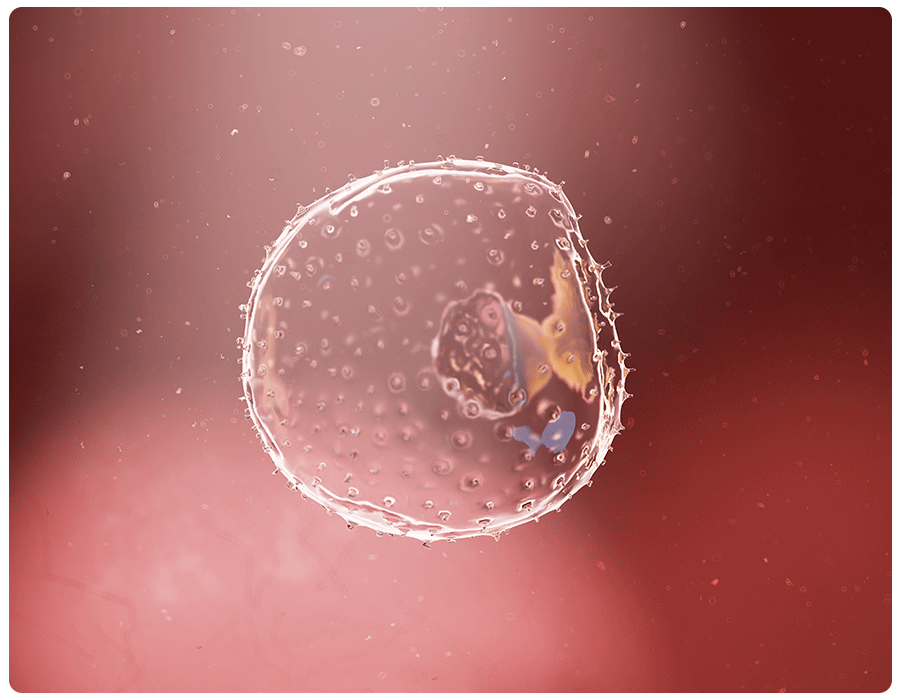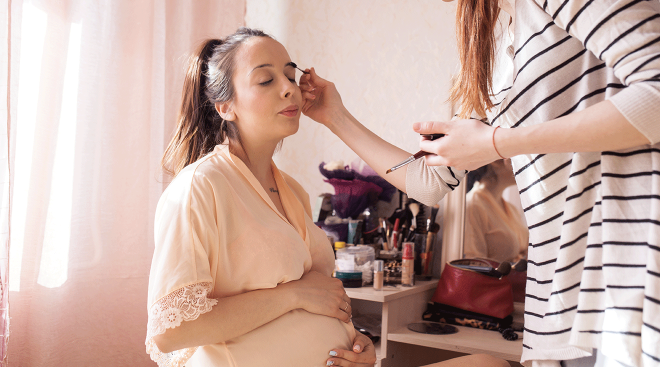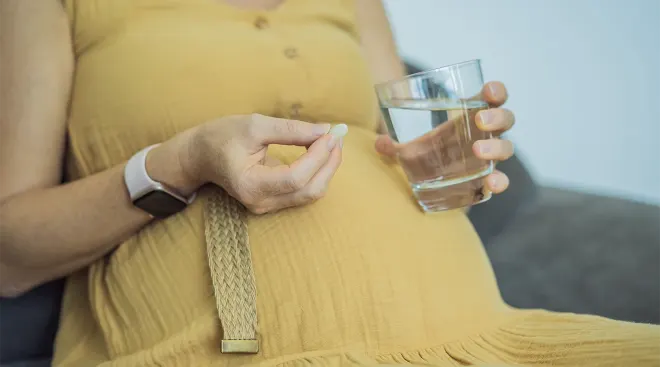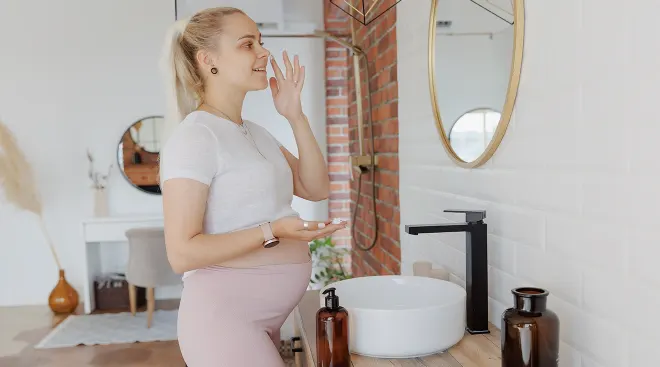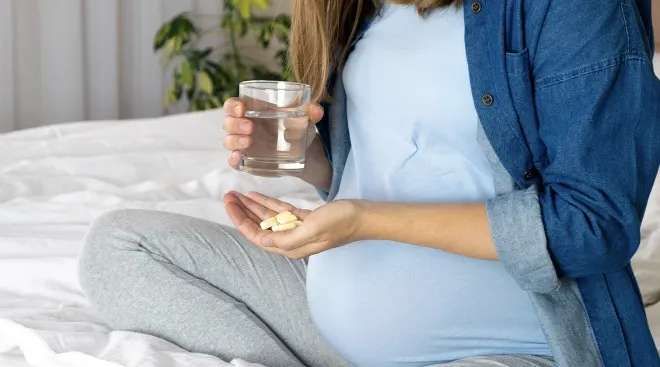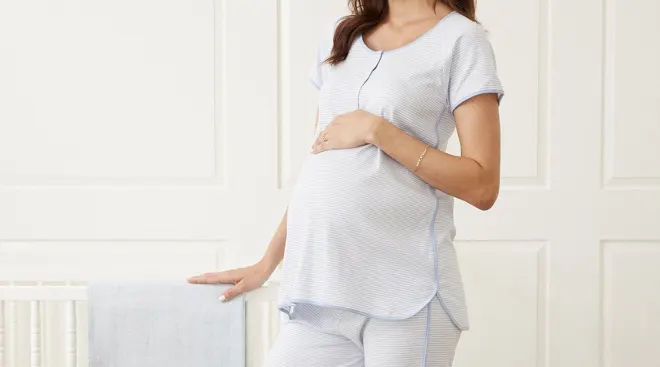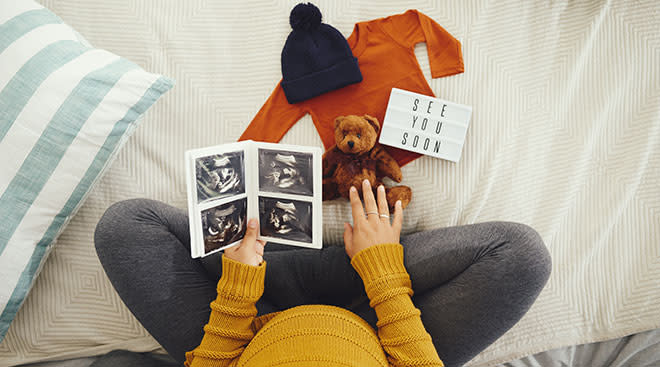- At this stage, you’re not truly pregnant. You’re actually in the second week of your ovulation cycle. (Confused? Read on!)
- You might be ovulating! Check for the subtle symptoms or consider getting an ovulation predictor kit. It could be baby-making time!
- If you’re trying to conceive, start preparing for the journey ahead. Begin taking a prenatal vitamin, cut out alcohol and tobacco and make some healthy lifestyle adjustments.
Think you’re 2 weeks pregnant? You might not be—here’s why. Most OBs count pregnancy starting from the first day of your last menstrual period (LMP). (It’s more accurate for doctors to estimate a due date this way.) So if you think you conceived about two weeks ago, you’re probably at least four weeks pregnant—maybe even five. We give you permission to skip ahead to week four. If you really are in the second week of your cycle and are trying to conceive, we’ve got some advice right here for you.
What’s Happening at 2 weeks pregnant? Your period should be finished and you might start ovulating in the next few days. So at 2 weeks pregnant, you’re actually not pregnant. But you may be close! If you’re preparing to try to get pregnant, keep your eyes open for signs of ovulation and do that thing you do to get pregnant—have plenty of sex around the time you expect to ovulate.
2 week ultrasound
You probably won’t have a 2 weeks pregnant ultrasound. If you could see inside your 2 weeks belly at the time of ovulation, it’d go a little something like this: First your ovary releases an egg (smaller than a fleck of ground pepper) into your fallopian tube, where it must be fertilized within 12 to 24 hours. If you’ve had sex within the last five days, there could still be living sperm inside you, and one of those could fertilize the egg. Otherwise, you’ll have to have sex stat to get pregnant.
Getting pregnant relies on timing sex for when you’re most fertile—this is probably in the two to five days before you ovulate and the day you actually ovulate. If you’ve got a regular 28-day cycle, chances are you ovulate between days 12 and 14. But let’s be real, not everyone has a regular 28-day cycle every month!
At two weeks pregnant, symptoms of ovulation can clue you in on the best time to have sex and hopefully conceive a baby. You’re probably ovulating if you notice these signs at week 2 of pregnancy:
“Egg white” cervical mucus
Sounds a little gross, but it’s true. Your cervical mucus becomes thin, clear and stringy, like egg whites, as you near ovulation. This consistency helps sperm travel toward the egg.
Better sense of smell
Believe it! Hormonal changes boost your ability to pick up different scents, which is probably nature’s way of helping you sniff out male pheromones in an effort to procreate.
Breast soreness or tenderness
Hormone surges associated with ovulation can make your boobs feel slightly sore.
Pelvic ache
As your ovary releases an egg, you might feel a little twinge in one side of your abdomen. This is the phenomenon known as Mittelschmerz, named for the doctor who first documented it.
Light spotting
You might notice a small tinge of red or brown on your underwear around the time of ovulation. This spotting can be common, but let your doctor know if you experience something heavier than just random spotting in between periods, or if that spotting is bothersome to you.
Increased sex drive
A higher libido is not uncommon during ovulation. You might “just know” that you’re ovulating and naturally get revved up for some baby-making sex.
Cervical changes
If you check your cervix routinely—something women who chart often do—you may notice a change as it becomes higher, softer and more open when you’re ovulating.
Some women buy an OTC ovulation prediction kit to help them figure out when they might be most fertile. A low-tech strategy is to have sex every other day from about day 8 to day 19 of your menstrual cycle—meaning toward the end of the second week to the beginning of the third.
How soon do pregnancy symptoms start?
For some people, pregnancy symptoms can begin just a few days after conception. You may experience physical symptoms, or you may just sense that something is different in your body. Other people may not feel any difference in their body until well after seeing a positive pregnancy test.
If you have conceived at 2 weeks pregnant, these are the symptoms that could soon clue you in:
Spotting
About 10 to 14 days after conception, you may notice a little spotting. This is caused by the embryo implanting itself into the lining of your uterus.
Frequent urination
Pregnancy hormones can cause you to take more trips to the bathroom in the first weeks of pregnancy.
Sore breasts and/or darker areolas
Pretty much as soon as those hormones appear, a woman’s body starts prepping her boobs for breastfeeding.
Fatigue
Total exhaustion is some women’s first clue they’re expecting. That’s because your body will use a ton of energy to grow baby.
Morning sickness
Probably the most notorious pregnancy symptom, nausea usually begins to rear its ugly head around week 4 to week 9.
Bloating
As your body starts to realize you’re pregnant, it will probably slow down the digestion process in an effort to deliver more nutrients to baby. This can result in a bit of gas and bloating—hey, maybe it will even look a bit like a 2 weeks pregnant belly! (Not that that exists.)
What are some unusual signs of early pregnancy?
Have you had nosebleeds, dizziness, acne or a weird, metallic taste in your mouth? These could be early signs that you’re pregnant. The earliest signs of pregnancy are the result of changes in your hormones, and those hormones can cause a variety of bizarre symptoms. While some of them are well known, like morning sickness and fatigue, you might not expect the weird taste in your mouth. Don’t worry about these odd symptoms, but do take note of them so you can communicate them to your doctor if they bother you.
If you do conceive at 2 weeks pregnant, symptoms won’t appear right away. In fact, you won’t be able to find out for sure if you’re pregnant until there’s enough pregnancy hormone in your system for a home pregnancy test to detect. That should happen at about week 4, which is the same time you’ll probably miss your period. Around this time, those hormone levels are finally high enough that they give you some noticeable pregnancy symptoms. Some women swear they do start noticing early pregnancy signs before week 4 though.
If you haven’t already, you should make a preconception visit with your ob-gyn. At this visit they'll make sure you're healthy to conceive, check your blood pressure and review your medical history, medications and immunizations. This visit is an important first to step to optimize your health before pregnancy!
It’s time to get ready. Here’s how you can get your ducks in a row to try to get pregnant.
Time your sex in order to conceive
Now it’s time to start “trying,” as the saying goes. At 2 weeks pregnant, you’re not actually pregnant yet, but you’re likely in the most fertile part of your cycle, so it’s time to get busy! Have sex regularly (although the best timing depends on your individual cycle to maximize your likelihood of getting pregnant).
Relax and take care of yourself
Trying to conceive is a lot more fun if you can relax and enjoy the process. Plus, stress could reduce your likelihood of getting pregnant as quickly. Try to incorporate relaxing, calming routines into your life like streaming a yoga class or spending time each day reading with a cup of tea. This is great for your overall mental health, but it just might help get that egg fertilized too.
Take care of your body
Your body is about to begin a big new job, so treat it well. Drink lots of water and eat well, and cut out any bad habits like smoking or drinking too much coffee. It’s a good idea to stop drinking alcohol now, just in case, and to get regular moderate exercise.
Frequently Asked Questions
What foods boost fertility?
Fertility is complicated and it’s important to stress that no one food will magically make you more fertile. However, doctors generally recommend following a healthy diet while you’re trying to get pregnant. That can include loading up on foods like vitamin C-rich citrus fruits, leafy greens for their calcium and iron content and berries, thanks to their anti-inflammation and antioxidant super powers. If you want to get pregnant and you’re concerned about your diet, talk to your healthcare provider or consider visiting a registered dietitian.
Is it safe to continue drinking alcohol when trying to conceive?
You don’t necessarily need to avoid alcohol altogether when you’re trying to get pregnant, but it’s a good idea to limit how much you have. Research suggests that having more than two drinks a day—which is more than the Dietary Guidelines for Americans recommends—could decrease your fertility and increase the amount of time it takes for you to conceive. Moreover, you won’t be able to confirm if your attempts were successful in your baby-making attempts for a few weeks, so once you start actively trying you should stop drinking as no amount of alcohol is considered safe during pregnancy.
Can you get pregnant if you don't ovulate?
Ovulation is an important step in getting pregnant—once you ovulate, your partner’s sperm can fertilize your egg. If you don’t ovulate, it’s usually not possible to conceive without reproductive assistance during that cycle. (That said, you may be able to conceive with the help of reproductive assistance.) Ovulation can be impacted by a range of things, including hormonal imbalances, stress, significant weight changes, certain medical conditions such as polycystic ovarian syndrome (PCOS) and your age. If your ovulation is irregular or you suspect that you’re not ovulating regularly, talk to a healthcare provider. They’ll likely want to evaluate you to see what’s going on.
How often should you have sex during your fertile window to try to conceive?
While you can technically have sex whenever you want to try to conceive, there is a standard that fertility experts recommend. Some suggest having sex every one to two days during your fertile window, and they usually recommend having sex on days 10, 12, and 14 of your cycle. This makes sure that sperm is constantly in your body when you ovulate, raising the odds that it will connect with an egg. Having a lot of sex during this time won’t necessarily improve the odds you’ll get pregnant. Keep in mind that if you or your partner has fertility issues, the recommendations from your healthcare provider may be slightly different.
Is pregnancy nine or 10 months? What are the different trimesters?
A typical pregnancy lasts about 40 weeks from the first day of your last menstrual period. Because of that, a standard pregnancy will last about 10 months. However, a baby is concerned full term when they’re born at 39 weeks. Pregnancy is divided into three trimesters. The first trimester is during the first 13 weeks; the second trimester is from weeks 14 to 27; the third trimester is weeks 28 to 40. Pregnant women generally feel their best during the second trimester—this is when you’re past morning sickness and before your belly is so big that it can feel uncomfortable to move.
Take a deep breath, and don't lose sight of your own mental health and well-being. Struggling with fertility takes a toll. Treat yourself kindly, show yourself grace and do something special for yourself.
Please note: The Bump and the materials and information it contains are not intended to, and do not constitute, medical or other health advice or diagnosis and should not be used as such. You should always consult with a qualified physician or health professional about your specific circumstances.
Alberts B, Johnson A, Lewis J, et al., Molecular Biology of the Cell. 4th edition, 2002
American College of Obstetricians and Gynecologists (ACOG), Morning Sickness: Nausea and Vomiting of Pregnancy, May 2020
American College of Obstetricians and Gynecologists, Problems of the Digestive System, August 2022 American College of Obstetricians and Gynecologists (ACOG), Trying to Get Pregnant? Here’s When to Have Sex, August 2023
American Pregnancy Association, 1-2 Weeks Pregnant
American Pregnancy Association, 4 Weeks Pregnant
Mayo Clinic, Rhythm Method for Natural Family Planning, May 2023
American Pregnancy Association, Can I Get Pregnant — Sex During Fertility Window?
American Pregnancy Association, Cervical Mucus and Early Pregnancy
American Pregnancy Association, Early Signs of Pregnancy
American Pregnancy Association, How to Get Pregnant — Best Tips to Help You Conceive
American Pregnancy Association, Ovulation Symptoms — Am I Ovulating?
Cleveland Clinic, Am I Pregnant?, July 26, 2022
Fertility & Sterility, Stress Reduces Conception Probabilities Across the Fertile Window: Evidence in Support of Relaxation, August 5, 2010
Mayo Clinic, Fetal development: The 1st trimester, June 3, 2022
Mayo Clinic, How Long Do Sperm Live After Ejaculation?, May 2022 Mayo Clinic, Is Implantation Bleeding Common in Early Pregnancy?, April 2022
March of Dimes, Health Eating Before Having a Baby, July 2020
Reproduction & Fertility, Effects of Lifestyle Factors on Fertility: Practical Recommendations for Modification, January 2021.
StatPearls, Mittleschmerz, May 1, 2023
Learn how we ensure the accuracy of our content through our editorial and medical review process.
Navigate forward to interact with the calendar and select a date. Press the question mark key to get the keyboard shortcuts for changing dates.



































